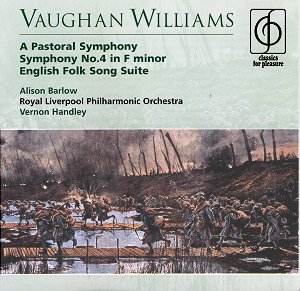Back in my early teens when I was eagerly discovering
the Vaughan Williams symphonies for the first time I acquired a copy
of André Previn’s recording of the Pastoral with the London
Symphony Orchestra on RCA. Although it was some time before I fully
understood how fine the performance was it was a recording I grew to
love. Some years later when I took the momentous decision to dispose
of my vinyl collection to fund the purchase of a new compact disc player
it was to Handley (then on EMI Eminence) that I turned as a worthy alternative.
Sadly (and inexplicably) the Previn recording is not currently available
and in its absence, although there have been a number of recordings
released in recent years, Andrew Davis, Leonard Slatkin, Roger Norrington
and Bernard Haitink amongst them, this Handley reissue at super budget
price still leads the field and is also an outright bargain for good
measure. The beauty of the performance stems from both the sublime playing
Handley draws from the RLPO and his own innate understanding of this
most personal of VW symphonies. The rapturous surface beauty of the
music is there sure enough but Handley never loses the feeling of profoundly
felt grief and loss that underpins the score; the composer’s poignant
response to lost friends, amongst them George Butterworth, and his journeys
"night after night with the ambulance wagon at Ecoivres
when we went up a steep hill and there was a wonderful Corot-like
landscape in the sunset". Handley’s performance never fails
to send a shiver up my spine, exploiting the wonderful transparency
of the composer’s scoring with consummate artistry. Try the majestically
haunting climax in the first movement from around 4’20", or the
opening of the Lento moderato with its dreamily distant horn
solo and misty strings. It is hard to imagine a more palpable sense
of atmosphere. The off-stage natural trumpet solo in the same movement,
inspired by the sounds of a bugler practising across the battle fields,
is both ethereal and deeply moving and when it comes to the Moderato
pesante third movement Handley manages to balance a fine sense of
dignity with the movement’s more lively dance like material. Here, as
elsewhere in the work, the horns of the RLPO are exceptional, underpinning
the textures with highly impressive solidity. I still eagerly await
Richard Hickox’s account of this work as part of his unfolding Chandos
cycle (his already released Fifth is particularly fine) but it will
have to go a long way to replace Handley at the top of my current list.
Whereas Hickox’s Fifth is up there with the best; his
most recent release, the Fourth, left me with somewhat mixed feelings.
Although the LSO play superbly for him the brisk tempo he adopts for
the opening Allegro does not allow the players to invest the
music with the sheer menace and venom that Handley captures with such
an admirable sense of drama. Conversely Hickox is possibly the only
conductor (at last!) with the courage to take the final movement at
the breakneck tempo the composer himself adopts in his vintage recording
of 1937 (available on Dutton and coupled with Barbirolli’s Fifth of
1944), a point that had me cackling with glee when I heard it for the
first time. It is not just the menace of the opening movement that Handley
captures so impressively but also the desolation of the closing paragraphs
with its beautiful, lingering flute solo. The horns, once again, are
quite superb (take a listen at around 2’28") and conjure up one
of my most enduring memories of Handley conducting Vaughan Williams
when, at an RPO performance of the Fourth sitting in the choir stalls,
I recall Handley’s face in this passage, grimacing and even laughing
at the horns in his efforts to goad them on. His pacing of the Andante
moderato is brilliantly judged and once again aided by atmospheric
playing from the orchestra whilst the biting, at time maliciously cackling
Scherzo, is brimful of energy and dark mischief. Having mentioned
that if there is a disappointment in Handley’s performance it is the
opening of the final movement, the towering ferocity the music gathers
through the final con epilogo fugato is second to none, culminating
in a conclusion of shattering devastation and power. I will always retain
a deep affection (if it is possible to be "affectionate" about
the fourth) for the composer’s own reading of this work but whilst Hickox
and Haitink both have their clear qualities, it is Handley once again
that I return too most frequently.
The lively account of the English Folk Song Suite,
Gordon Jacob’s orchestration of the composer’s original wind band score
that opens the disc, is almost unnecessary in the company of the symphonies
but makes an attractive opener and filler, giving the disc a very generous
playing time of nearly seventy eight minutes.
I suspect that there cannot be too many ardent Vaughan
Williams admirers who do not already own Handley’s symphonic cycle but
if not then this disc is an essential purchase. Happily for the newcomer,
it’s also a fine introduction to the breadth of the composer’s symphonic
oeuvre, both in terms of its price and quality of performance.
Christopher Thomas.
See
other Handley Classics for Pleasure releases


